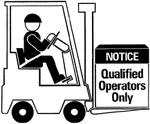| |
 |
Federal OSHA has no requirement that a forklift operator have a valid motor vehicle driver's license. HOWEVER: OSHA does require that every forklift operator be trained on the truck- and workplace topics and evaluated by a qualified trainer,
In order to start the process of getting your forklift certification, you must first verify that you meet all of the following requirements:
-
U.S. Citizenship or, if you are not a U.S. Citizen, evidence of lawful presence
-
You must be at least 18 years of age or older
-
You must have limited or no visual impairments, or any physical disabilities that would prevent safe operation of the vehicle.
It is not required to have previous forklift experience to apply for most forklift operator positions. Once you are hired, your employer is required to train you on the equipment located in their facility. |
| |
GET YOUR CERTIFIED OSHA FORKLIFT DRIVER LICENSE |
|
Employers are required by law to ensure that their
industrial truck operators receive both hands-on and
formal (classroom) training by a qualified instructor. |
|
|
|
| |
 |
|
 All operators of lift trucks must be trained in order to be compliant. All operators of lift trucks must be trained in order to be compliant. |
 Compliance with these regulations is the employer's responsibility. Compliance with these regulations is the employer's responsibility. |
 All operators of lift trucks must be re-trained EVERY 3 YEARS. All operators of lift trucks must be re-trained EVERY 3 YEARS. |
|
 |
Requirements include:
 Classroom training with specific requirements; Classroom training with specific requirements;
 Work site hazard training; Work site hazard training;
 Orientation to specific lift truck models being used; Orientation to specific lift truck models being used;
 Skill assessment of individual operators Skill assessment of individual operators |
|
| |
| Refresher Training Requirement |
OSHA 29 cfr 1910.178 regulations for Forklift Operator Training,
includes a requirement for Refresher Training when: |
 |
Operators have been observed to operate in an unsafe manner. |
 |
There has been an accident or a near miss. |
 |
Operators are reassigned to a new type of truck of a different work environment. |
|
|
|
Are Your forklift operators trained?
Is your training OSHA compliant? |
In addition to OSHA compliance,
BENEFITS of refresher training can include: |
| Why is it important to comply? |
 Safer work environment Safer work environment |
 It is the law! It is the law! |
 Less forklift accidents Less forklift accidents |
 It's the right thing to do. It's the right thing to do. |
 Reduced insurance costs Reduced insurance costs |
 It will save you money! It will save you money! |
 Reduced product damage Reduced product damage |
 No one likes accident investigations No one likes accident investigations |
 Improvement in picking orders Improvement in picking orders |
 No one likes Prohibition notices No one likes Prohibition notices |
 Production improvement Production improvement |
 No one likes Damaged machinery No one likes Damaged machinery |
 Lower liability insurance Lower liability insurance |
 No one likes Prosecution costs No one likes Prosecution costs |
 Less damage to plant Less damage to plant |
 Prevent fines Prevent fines |
 Turns liabilities into assets Turns liabilities into assets |
 Avoid imprisonment Avoid imprisonment |
 Increased profits Increased profits |
 Prevent a bad reputation Prevent a bad reputation |
 Good morale Good morale |
 Control compensation claims Control compensation claims |
 Less truck maintenance Less truck maintenance |
 Your firm risks OSHA's continued scrutiny. Your firm risks OSHA's continued scrutiny. |
 More competent and safer workforce More competent and safer workforce |
|
| Under the new regulations, all industrial truck operators in all industries are included in OSHA Standard 29CFR1910.178. That includes but is not limited to Construction (1926), General Industry, Shipyards (1915), Marine Terminals (1917) and Longshoring operations (1918), with the exception of Agricultural Operations.
All industrial Truck operators hired BEFORE December 1st. 1999, must receive the required training and written evaluation BEFORE December 1st. 1999, and the company must maintain an operator file with proof of adequate training.
All industrial Truck operators hired AFTER December 1st. 1999, must receive the required training and written evaluation BEFORE they are allowed to operate the equipment, and the company must maintain an operator file with proof of adequate training.
Forklift trucks are so dangerous that the Fair Labor Standards Act (FLSA) prohibits any workers under age 18 from operating forklifts or similar equipment in nonagricultural industries. And no one over 18 can operate them unless they have been properly trained and authorized.
|
OSHA can impose a $7,000 fine for each untrained operator (up to $70,000 fine for willful violations)
During the next year, 100,000 injuries involving forklifts will be reported.
100 workers will lose their lives. Don't let one of your employees be one of them. |
| |
|
| |